class: middle, center # Lecture 12 ### 8 November 2021 .smaller[ Admin Matters<br> Unit 28: struct<br> Unit 29: stdio<br> Recap of CS1010<br> ] --- class: middle .fit[] .tiny[Submitted by Hao Yi] --- class: middle,bottom background-image: url(figures/meme/from-students/making-meme.jpg) .tiny[Submitted by Benjamin Poh] --- 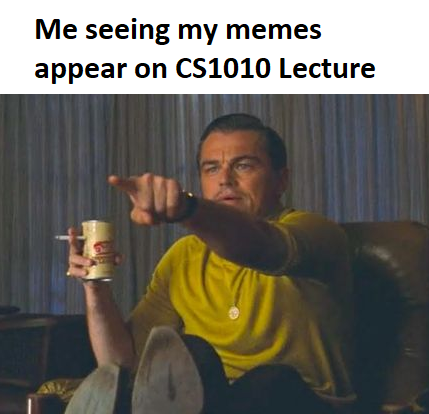 .tiny[Submitted by Benjamin Poh] --- class: middle ### Last Catch-Up Session - This Saturday, 10 am - 12 noon - Q and A format, as usual - Watch out Piazza for Pigeonhole link --- class: middle ### Last Tutorial - Final questions (from last AY) - Mounted as a ungraded Quiz --- class: middle ### Last Lab - PE2 questions (last Saturday) --- class: bottom background-image: url(figures/meme/from-students/wrong-test-case-Muthya.jpg) .tiny[Submitted by Muthya] --- class: bottom background-image: url(figures/meme/from-students/pe2-two-from-Muthya.jpg) .tiny[Submitted by Muthya] --- class: middle 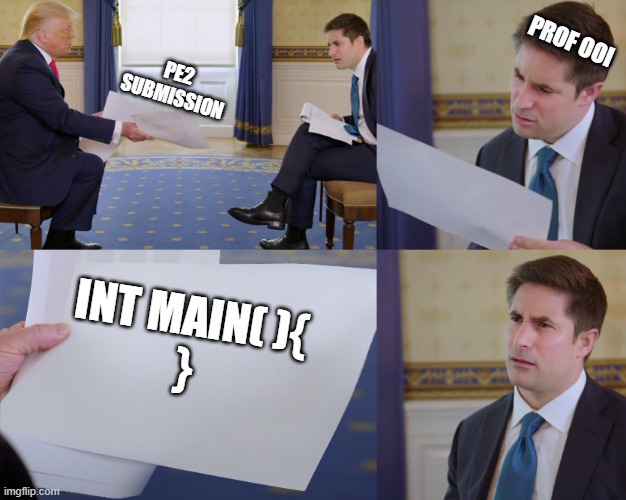 .tiny[Submitted by Hao Yi] --- class: middle  .tiny[Submitted by Fuxi (Tutor)] --- class: middle ### Last Quiz - New self-diagnostic quiz for this week - All four self-diagnostic quizzes since midterm break re-opened - Due on Wednesday night as usual --- class: middle ### Last Assignment - Due Friday midnight (but you can submit before next Tuesday, 23:59 without penalty) --- class: middle 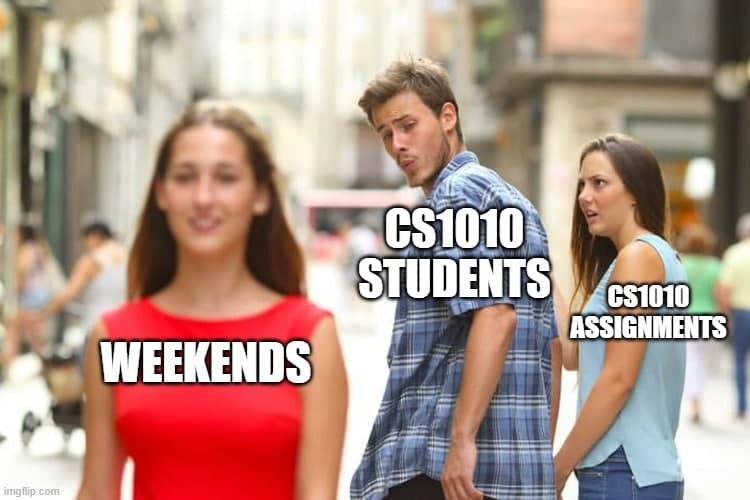 .tiny[Submitted by Wilson Ng] --- class: middle ### Final Exam - **THURSDAY**, 25 Nov, 2021 (5pm - 7pm) - Coverage: Everything (except stdio) - Open Book --- class: middle,center background-image: url(figures/ceg-shirt.jpg) ### `struct` --- class: middle ### Some things belong together - 1D array and its length - 2D array, its width, and its height - x and y position in a maze - r, g, b of a pixel --- class: middle,center ## Defining a `struct` --- class: middle ```C struct matrix { double** array; long num_of_rows; long num_of_columns; }; ``` --- class: middle ```C struct list { char *array; long length; }; ``` --- class: middle ```C struct module { char *code; char *title; long mc; }; ``` --- class: middle ### Declaring a struct variable ```C struct module cs1010; ``` --- class: middle ### Initializing a struct variable .tiny[ ```C struct module cs1010; cs1010.code = "CS1010"; cs1010.title = "Programming Methodology"; cs1010.mc = 4; ``` ] --- class: middle ### Declaring AND Initializing a struct variable .tiny[ ```C struct module cs1010 = { .code = "CS1010", .title = "Programming Methodology", .mc = 4 }; ``` ] --- class: middle ### Reading and writing members of a `struct` .tiny[ ```C cs1010.mc = hours_spent_per_week/2.5; cs1010_println_long(cs1010.mc); ``` ] --- class: middle,wide ### `struct` as pass-by-value parameters to a function .tiny[ ```C void update_mc(struct module cs1010, long weekly_hours_spent) { cs1010.mc = weekly_hours_spent/2.5; } ``` ] --- class: middle,wide ### `struct` as pass-by-reference parameters to a function .tiny[ ```C void update_mc(struct module *cs1010, long weekly_hours_spent) { (*cs1010).mc = weekly_hours_spent/2.5; } ``` ] --- class: middle,wide ### `struct` as pass-by-reference parameters to a function .tiny[ ```C void update_mc(struct module *cs1010, long weekly_hours_spent) { cs1010->mc = weekly_hours_spent/2.5; } ``` ] --- class: middle,wide ### How to pass multiple values back to caller (Method 1) .tiny[ ```C void find_max_steps(long n, long *max_n, long *max_num_steps) { *max_num_steps = 0; *max_n = 1; for (long i = 1; i <= n; i += 1) { long num_of_steps = count_num_of_steps(i); if (num_of_steps >= *max_num_steps) { *max_n = i; *max_num_steps = num_of_steps; } } } ``` ] --- class: middle ### How to pass multiple values back to caller (Method 2) ```C struct answer { long max_n; long max_num_steps; }; ``` --- class: middle .tiny[ ```C struct answer find_max_steps(long n) { struct answer ans = { .max_n = 1, .max_num_steps = 0 }; for (long i = 1; i <= n; i += 1) { long num_of_steps = count_num_of_steps(i); if (num_of_steps >= ans.max_num_steps) { ans.max_n = i; ans.max_num_steps = num_of_steps; } } return ans; } ``` ] --- class: middle,center ## Defining Your Own Type --- class: middle .tiny[ ```C typedef unsigned long person_t; : void is_contact(char **network, person_t i, person_t j) { : } ``` ] --- class: middle ```C typedef struct module { char *code; char *title; long mc; } module; ``` --- class: middle ```C typedef struct { char *code; char *title; long mc; } module; ``` --- class: middle,wide .tiny[ ```C void update_mc(module cs1010, long weekly_hours_spent) { cs1010.mc = weekly_hours_spent/2.5; } ``` ] --- class: middle,center ## Reading and Printing without `libcs1010` --- class: middle,center ## `printf` and `scanf` --- class: middle ```C printf("%s is a %ld-MC module\n", module.code, module.mc); ``` --- class: middle .tiny[ ``` %[flags][field_width][.precision][length_modifier]specifier ``` ] --- class: middle - `printf` behaves differently from functions that you have been writing. - It can take in different number of arguments of different type. --- class: middle ```C long width; long height; scanf("%ld %ld", &width, &height); ``` --- class: middle .tiny[ ``` %[*][field_width][length_modifier]specifier ``` ] --- class: middle - space in between the format specifier matches zero or more white spaces (space, tab, newline) - Scanning stops when an input character does not match such a format character or when an input conversion fails --- class: middle,center ## Recap of CS1010 --- class: middle,center ## What Have You Learned? --- class: middle, wide ### 1. How to write C - types, functions, arithmetic ops, if-else, logical expressions, loops, arrays, pointers, memory management, preprocessor, struct, I/O - Others we skipped: break/continue, switch, common C libraries API, bit operations, union, enum, argc/argv, separate compilation etc. --- class: bottom, right background-image: url(figures/meme/from-students/pointers-zhen-wei.jpg) .tiny[Submitted by Zhen Wei (Tutor)] --- class: middle  .tiny[Submitted by Jia Lun (Tutor)] --- class: middle, wide ### 2. How a C program behaves - machine code, data in memory, types, call stack, memory addr, call by value/ref, heap --- class: middle ### 3. Tools and Practices - `clang`, `vim`, `bash`, style, assertion, documentation, (some) testing, (some) secure programming - Others we skipped: debugger, valgrind, git, make --- class: bottom background-image: url(figures/meme/from-students/clang-tidy-from-Hao-Yi.jpg) .tiny[Submitted by Hao Yi] --- class: middle 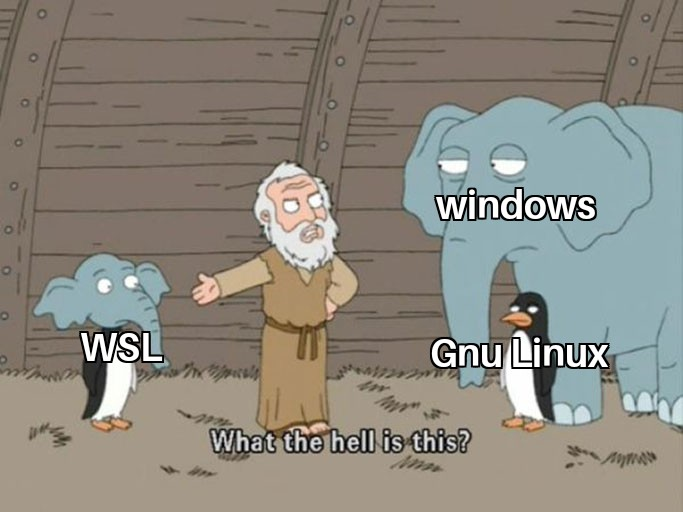 .tiny[Submitted by Jialun (Tutor)] --- class: middle ### 4. Problem Solving - decomposition, recursion, flowchart, conditionals, assertions, loops, invariants, running time analysis, sorting, searching, efficiency --- class: bottom background-image: url(figures/meme/from-students/ash-Omn-from-Joo-Hoe.png) .tiny[Submitted by Joo Hoe] --- class: middle  .tiny[Submitted by Pereira] --- class: middle,center ### Computational Thinking The mental process associated with computational problem solving --- class: middle ### Four Pillars of Computational Thinking - Decomposition - Pattern Recognition - Abstract - Algorithms (We have been teaching these without being explicit about it) --- class: middle,center ## Decomposition --- class:middle ### Find the Std Dev (Lecture 2) - Give an algorithm to find the standard deviation of a list $L$ of $k$ integers. $$\sqrt{\frac{\sum\_{i=0}^{k-1}(l\_i - \mu)^2}{k}}$$ --- class:middle,center ### Decomposition makes a problem easier to solve --- class:middle,wide ### Taxi .tiny[ ```C double surcharge(long day, long hour, long minute) { if (is_weekday(day) && is_morning_peak(hour, minute)) { return MORNING_SURCHARGE; } if (is_evening_peak(hour)) { return EVENING_SURCHARGE; } if (is_midnight_peak(hour)) { return MIDNIGHT_SURCHARGE; } return 1.0; } ``` ] --- class:middle,wide .tiny[ ```C bool is_weekday(long day) { return (day >= 1 && day <= 5); } bool is_morning_peak(long hour, long minute) { return (hour >= 6 && hour < 9) || (hour == 9 && minute <= 29); } bool is_evening_peak(long hour) { return (hour >= 18 && hour <= 23); } bool is_midnight_peak(long hour) { return (hour >= 0 && hour < 6); } ``` ] --- class: middle,wide ### Social .tiny[ ```C // is i and j connected through some m at h+1 hops? char is_connected(long n, char **degree_1, char **degree_h, long i, long j) { for (long m = 0; m < n; m += 1) { if (is_friend(degree_1, i, m) && is_friend(degree_h, m, j)) { return FRIEND; } } return STRANGER; } ``` ] --- class: middle,wide ### Social .tiny[ ```C bool is_friend(char **network, int i, int j) { if (i >= j) { return network[i][j] == FRIEND; } return network[j][i] == FRIEND; } ``` ] --- class: middle,center ### Decomposition Break complex problems down into "bite-size" sub-problems that you can solve --- class: middle,center,wide ### Decomposition George Polya said: "If you can't solve a problem, there is an easier problem that you can solve: find it" --- class: middle ### Decomposition - Solve the easier problem first, then generalized. - E.g., `social`: find two-hops friends, then generalized to k hops - E.g., `pattern`: draw the left most cell, then generalized --- class: middle ### Recursion - Assume the easier problem is solved, then generalized. - E.g., `reverse`: assume we can reverse the rest of the numbers, then reverse the number - E.g., `tower of hanoi`: assume we know how to move k-1 discs, then solve for k disc. --- class: middle ### Four Pillars of Computational Thinking - Decomposition - Pattern Recognition - Abstract - Algorithms --- class: middle,center ## Pattern Recognition --- class: middle,center ### Pattern Recognition Observe trends and patterns, then generalized --- class: middle ### Taxi - The first 1 km or less (Flag Down) $3.20 - Every 400 m thereafter or less, up to 10 km $0.22 - Every 350 m thereafter or less, after 10 km $0.22 (See the pattern?) --- class: middle ### Taxi | unit dist | max dist | fare | |-----------|-----------|------| | Every 1000 m | next 1 km | $3.20 | | Every 400 m | next 9 km | $0.22 | | Every 350 m | next $\infty$ km | $0.22 | --- class: middle, wide .tiny[ ```C double fare = 0; for (int i = 0; i < NUM_TIERS; i += 1) { if (distance < 0) { return fare; } long min_dist = min(distance, tiers[i].max_distance); double units = ceil(min_dist*1.0/ tiers[i].unit_distance); fare += tiers[i].fare * units; distance -= tiers[i].max_distance; } ``` ] --- class: middle,center) ### Inversion 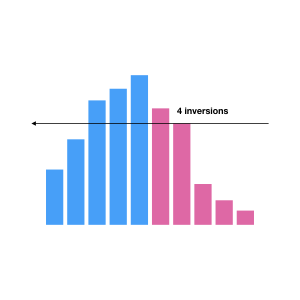 --- class: middle,center ### Identifying loop invariants is partly about pattern recognition! --- class: middle ## Abstraction --- class: middle ### Abstraction - Identifying and abstracting relevant information - Hide details - Adapt to change - Generalize to other domain --- class: middle,center ### Data Abstraction Model the problem with only the necessary information --- class: middle,center .fit[ 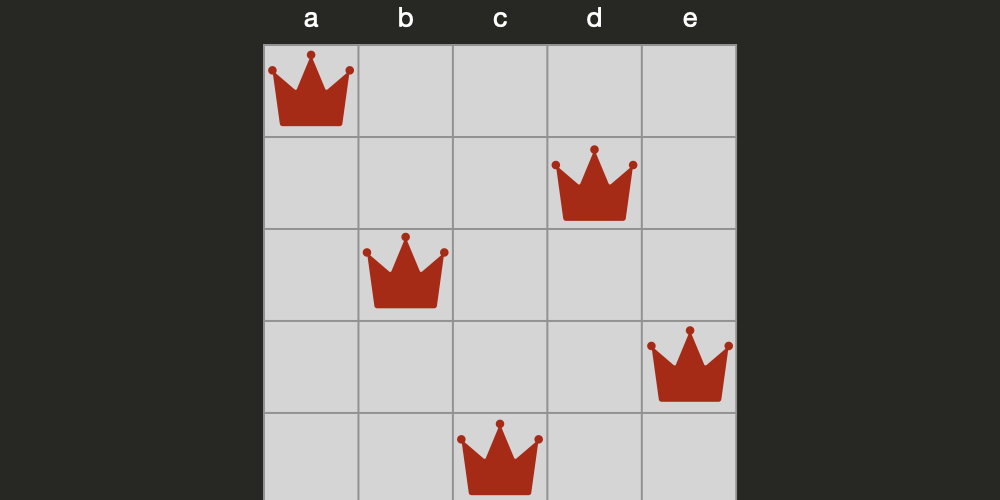 ] --- class: middle ### Peak - Only an array of numbers is required to model the problem. --- class: middle,center ### Functional Abstraction Hide details and focus on higher-level logic --- class:middle,wide What if the peak hours are extended? surchange increases? .tiny[ ```C double surcharge(long day, long hour, long minute) { if (is_weekday(day) && is_morning_peak(hour, minute)) { return MORNING_SURCHARGE; } if (is_evening_peak(hour)) { return EVENING_SURCHARGE; } if (is_midnight_peak(hour)) { return MIDNIGHT_SURCHARGE; } return 1.0; } ``` ] --- class:middle,wide Does it matter (to this code) if jagged or rectangular array is used? .tiny[ ```C // is i and j connected through some m at h+1 hops? char is_connected(long n, char **degree_1, char **degree_h, long i, long j) { for (long m = 0; m < n; m += 1) { if (is_friend(degree_1, i, m) && is_friend(degree_h, m, j)) { return FRIEND; } } return STRANGER; } ``` ] --- class: middle from Lecture 1.. ### Work hard ### Work very very hard --- class: bottom background-image: url(figures/meme/from-students/cs1010s-from-Leonardo.png) .tiny[Submitted by Leonardo] --- class: bottom background-image: url(figures/meme/from-students/hard-to-swallow-Hao-Yi.jpg) .tiny[Submitted by Hao Yi] --- class: bottom background-image: url(figures/meme/from-students/GPA-wilson.jpg) .tiny[Submitted by Wilson Ng] --- class: center,middle ## What doesn't kill you only makes you stronger --- class: middle Special Thanks to - All the students - All the tutors - The e-exam logistic team (Song Kai, Xinjian, Chengxin) - Mr. Tan Hsiao Wei and his team of sys admin --- class: middle .fit[] --- class: middle .fit[] --- class: center,middle 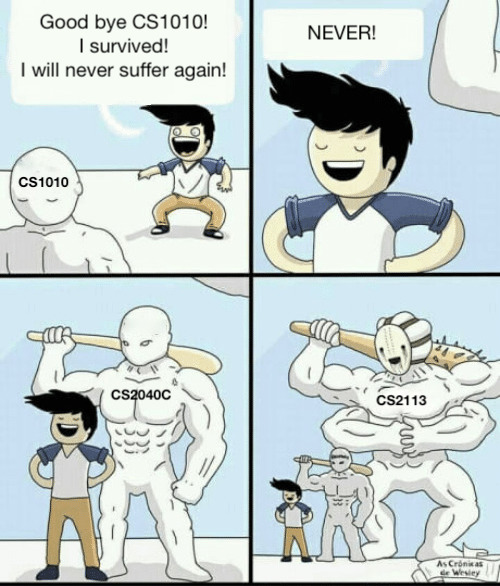 class: bottom .tiny[ Version: 1.0 Last Updated: Sun Nov 1 11:59:04 +08 2020 ]